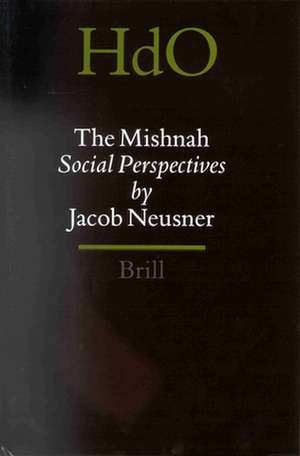The Mishnah, Social Perspectives Volume 2
Autor Jacob Neusneren Limba Engleză Paperback – 20 mai 2002
Preț: 370.36 lei
Preț vechi: 435.72 lei
-15% Nou
Puncte Express: 556
Preț estimativ în valută:
70.88€ • 73.44$ • 59.15£
70.88€ • 73.44$ • 59.15£
Carte indisponibilă temporar
Doresc să fiu notificat când acest titlu va fi disponibil:
Se trimite...
Preluare comenzi: 021 569.72.76
Specificații
ISBN-13: 9780391041592
ISBN-10: 0391041592
Pagini: 270
Dimensiuni: 154 x 232 x 22 mm
Greutate: 0.4 kg
Editura: Brill
Colecția Brill
ISBN-10: 0391041592
Pagini: 270
Dimensiuni: 154 x 232 x 22 mm
Greutate: 0.4 kg
Editura: Brill
Colecția Brill
Notă biografică
Jacob Neusner is Research Professor of Religion and Theology and Senior Fellow of the Institute of Advanced Theology at Bard College, Annandale-Hudson, N.Y.
Descriere
For Aristotle, politics, economics, and philosophy define the social construction of any society. For Judaism, the Mishnah—along with Scripture—sets forth the systematic statement for understanding the social construction and world view of Judaism around 200 C.E. The Mishnah functioned as the basic law in the holy land and was adopted also by Jews in the Diaspora, from Babylonia to the western satrapies of the Iranian empire of the Sasanians. Professor Jacob Neusner takes seriously the three principal tasks of theoretical thought enjoined by Aristotle and asks us to look at the Mishnah not as an inert collection of traditions passed on, but as a deliberate, programmatic statement of Judaism’s way of life and world view. He points to the systematic nature of the Mishnah, with its six divisions, and shows how collectively those divisions cover the everyday life of the people. The Mishnah contains independent judgements about the nature of the system and does not merely rehearse what tradition says about a given topic. This interpretive aspect of the Mishnah has been ignored to the interpreter’s peril, because it is precisely by paying attention to how the Mishnah uses traditions for its own purposes that the interpreter can appreciate the building blocks of Judaism: its politics, economics, and philosophy.
This publication has also been published in hardback, please click here for details.
This publication has also been published in hardback, please click here for details.
